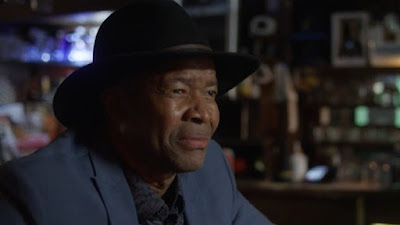The Paris Blues Club in Harlem is decidedly not named in honor of the 1961 Martin Ritt film. Even though that Sidney Poitier vehicle was all about jazz musicians, it clearly suggested they could only attain true respectability through proper classical music. As far as the musicians who play at Paris Blues are concerned, you can stick that kind of respectability in your ear. They are truly artists in their own right, but they still play to entertain the neighborhood Harlem crowd—but until this fateful night, dancing was strictly forbidden by New York’s archaic Cabaret Laws. Unfortunately, tragedy might come with the joy of the law’s repeal in Christina Kallas’s Paris is in Harlem, which screens as part of the (online) 2022 Slamdance Film Festival.
The somewhat mysterious prologue suggests the night will come to an ominous end for someone, but then Kallas rewinds, showing how nearly everyone had a very bad day up to that point. Several happen to be professors (or more likely untenured instructors) at a college that bears some geographic resemblance to Columbia. Each is facing potentially career ending charges, for either racial insensitivity or sexual harassment, which they find somewhat perverse, given Ben’s South Asian heritage and Sila’s status as a prominent feminist scholar.
Their lives will intertwine with a lonely Uber driver eager for social interaction, two teenagers who stole a handgun from an active-shooter workshop instructor, the musicians booked at Paris Blues, the bartender (and Sila’s accuser) Ike, and the club’s cool-as-a-cucumber owner, Sam (transparently inspired by the real-life owner Samuel Hargress Jr., who passed away last April).
Probably, the most important aspect of the film is the real-deal music that drives everything, giving urgency to the interpersonal conflicts. It features musicians like Antoine Roney (brother of the late Wallace), William “Spaceman” Patterson, and vocalist Camille Thurman essentially playing analogs of themselves. They also exhibit remarkable flexibility, locking into funky grooves one minute and then segueing into free jazz explorations when Sam suspects an undercover dancing narc is prowling in the club.
The intersecting drama is also often provocative, usually in the better sense of the word. The administrative proceedings Ben and Sila face take on David Mamet-ish dimensions, rendered in an Altman-esque style. While we are led to suspect each contributed to their own predicaments, the film gives a sense of how precarious it is to work in contemporary academia. Paris/Harlem does not exactly take their sides, but it certainly is not an advertisement for woke-ism.
The deliberately rough-around-edges vibe does not always work. Frankly, Ike’s opening riff on Slaughterhouse-Five almost comes across like a Tarantino parody, so viewers should be advised it does not represent the rest of the film. On the other hand, the scenes of Ben’s and Sila’s hearings have real bite, precisely because you really have to seriously consider them to decide which way they cut. Similarly, we see Sam turn on a dime from a fatherly figure to someone who makes snap judgements based on superficial characteristics, which is a very human habit.
While the ensemble is generally quite strong, Leon Addison Brown is a masterful standout as the semi-fictionalized Sam. He shows us the steeliness beneath Sam’s laidback charm and the anger he tries to keep in check. It is awards-worthy work. Stephen Vause also really makes quite a [positive] impression in relatively limited time as Arthur, the overly talkative Uber driver, who brings surprisingly empathic depth to the character.
Kallas is not the first filmmaker to take inspiration from Paris Blues. Nadhege Ptah also used the club as the backdrop for her short Paris Blues in Harlem. That was a nice enough film, but Kallas engages with the music on a much deeper level. For further comparisons, you could possibly describe her film as a much more economical Short Cuts, but do not liken it to Dustin Guy Defa’s Person to Person, because it has more substance and a far greater understanding of jazz. Recommended for jazz listeners and fans of NY street smart indies, Paris is in Harlem screens online through Sunday (2/6), during this year’s Slamdance.

